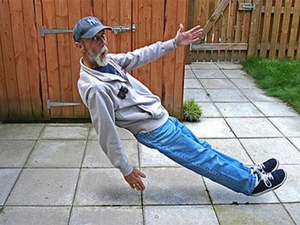



Date:31/08/16
 Falling is awful. It causes irreparable harm to senior citizens and the fear of falling reduces senior citizen mobility drastically, creating a feedback loop that can be catastrophic. Now, thanks to a team at the Sinclair School of Nursing and the College of Engineering at the University of Missouri, caregivers can predict falls up to three weeks out, allowing for care and assistance before its needed.
Falling is awful. It causes irreparable harm to senior citizens and the fear of falling reduces senior citizen mobility drastically, creating a feedback loop that can be catastrophic. Now, thanks to a team at the Sinclair School of Nursing and the College of Engineering at the University of Missouri, caregivers can predict falls up to three weeks out, allowing for care and assistance before its needed.
The system is non-wearable and uses cameras to assess gait speed and stride length. The researchers found that a “gait speed decline of 5 centimeters per second was associated with an 86.3 percent probability of falling within the following three weeks.” Further, a shortened stride length “was associated with a 50.6 percent probability of falling within the next three weeks.” With these two pieces of data caregivers can intervene before things get out of hand.
“Aging should not mean that an adult suddenly loses his or her independence,” said Marilyn Rantz, Professor Emerita of Nursing. “However, for many older adults the risk of falling impacts how long seniors can remain independent. Being able to predict that a person is at risk of falling will allow caretakers to intervene with the necessary care to help seniors remain independent as long as possible.”
The team based their system at TigerPlace, a retirement residence in Columbia, Missouri. They installed sensors around the location and set up an email alert system “when irregular motion was detected.” It’s a great use of some intelligent technology and, what’s more, it requires no wearables and is completely passive.
New sensor system can predict when senior citizens are heading for a fall
 Falling is awful. It causes irreparable harm to senior citizens and the fear of falling reduces senior citizen mobility drastically, creating a feedback loop that can be catastrophic. Now, thanks to a team at the Sinclair School of Nursing and the College of Engineering at the University of Missouri, caregivers can predict falls up to three weeks out, allowing for care and assistance before its needed.
Falling is awful. It causes irreparable harm to senior citizens and the fear of falling reduces senior citizen mobility drastically, creating a feedback loop that can be catastrophic. Now, thanks to a team at the Sinclair School of Nursing and the College of Engineering at the University of Missouri, caregivers can predict falls up to three weeks out, allowing for care and assistance before its needed.The system is non-wearable and uses cameras to assess gait speed and stride length. The researchers found that a “gait speed decline of 5 centimeters per second was associated with an 86.3 percent probability of falling within the following three weeks.” Further, a shortened stride length “was associated with a 50.6 percent probability of falling within the next three weeks.” With these two pieces of data caregivers can intervene before things get out of hand.
“Aging should not mean that an adult suddenly loses his or her independence,” said Marilyn Rantz, Professor Emerita of Nursing. “However, for many older adults the risk of falling impacts how long seniors can remain independent. Being able to predict that a person is at risk of falling will allow caretakers to intervene with the necessary care to help seniors remain independent as long as possible.”
The team based their system at TigerPlace, a retirement residence in Columbia, Missouri. They installed sensors around the location and set up an email alert system “when irregular motion was detected.” It’s a great use of some intelligent technology and, what’s more, it requires no wearables and is completely passive.
Views: 541
©ictnews.az. All rights reserved.Similar news
- The mobile sector continues its lead
- Facebook counted 600 million active users
- Cell phone testing laboratory is planned to be built in Azerbaijan
- Tablets and riders outfitted quickly with 3G/4G modems
- The number of digital TV channels will double to 24 units
- Tax proposal in China gets massive online feedback
- Malaysia to implement biometric system at all entry points
- Korea to build Green Technology Centre
- Cisco Poised to Help China Keep an Eye on Its Citizens
- 3G speed in Azerbaijan is higher than in UK
- Government of Canada Announces Investment in Green Innovation for Canada
- Electric cars in Azerbaijan
- Dominican Republic Govt Issues Cashless Benefits
- Spain raises €1.65bn from spectrum auction
- Camden Council boosts mobile security





















